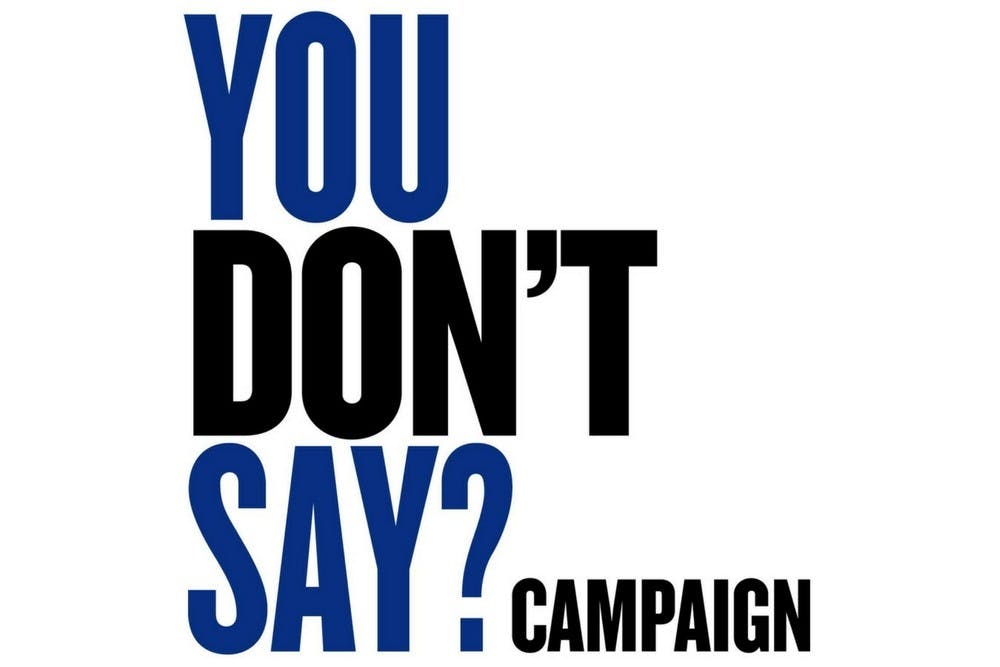In light of the derogatory rhetoric that has characterized the current political climate, this year’s edition of the "You Don’t Say?" campaign at Duke has taken on a new relevance.
Originally intended to raise awareness about offensive and marginalizing language using posters and banners, the "You Don't Say?" campaign was founded in January 2014 as a collaboration between the student organization "Think Before You Talk" and Blue Devils United, the LGBTQ+ student group. Since its founding, "You Don't Say?" has helped inspire over 150 similar campaigns on six different continents.
This year’s campaign—run by sophomores Sabriyya Pate and Steven Hassey—connected with people and groups of different backgrounds to display the effects of political rhetoric on personal identities. One of those individuals was sophomore Isabella Arbelaez, who is the daughter of a Colombian immigrant. Arbelaez used the campaign to call attention to rhetoric surrounding immigration.
“I don’t say ‘illegal alien’ because no human can be alien to us,” Arbelaez said. “To exist cannot make one unhuman; to exist cannot be illegal…. Let’s treat one another with the dignity we all deserve.”
She added that she believes that President Donald Trump’s language on immigration—which has included referring to some Mexican immigrants as "rapists" and "killers"—reflects a continued prejudice and discrimination against immigrant communities.
Pate and Hassey noted that the heightened anxiety on campus after the election influenced the campaign's focus this year.
The Student Organization Funding Committee within Duke Student Government allocated funding for printing banners and posters of photographed members of the campaign. The posters have been on display outside of West Union throughout the last month. Another set of them were recently posted in the Bryan Center.
“It was the right time for many of the photos to come out," Pate said.
Still despite the campaign's increased spotlight on derogatory political rhetoric, other aspects of it have been unrelated to politics. Sophomore Shom Tiwari, for example, campaigned against the word ‘psycho’.
“I don’t say ‘psycho’ because it perpetuates inaccurate stereotypes about mental health,” Tiwari said, adding that the topic is important to him because many of his family members have lived with mental health needs and have had varying levels of success in receiving treatment.
Tiwari explained that while seeking treatment should not be frowned upon, it all too often is.
“Duke has resources such as [Counseling and Psychological Services], but it’s still not a big enough priority on campus, and I don’t think that people balance their mental health needs with schoolwork as best they can,” Tiwari said.
The campaign's Facebook page has achieved significant outreach, receiving over 19,990 total page likes. Both Arbelaez and Tiwari believe that the campaign has been successful in sparking conversations and should continue expanding to various other communities across the globe.
“YDS gives students a platform to talk about their personal experiences and why they don’t use certain rhetoric in their everyday vernacular,” Hassey said. “Hopefully, these students can serve as teaching lessons for others.”
Nevertheless, Tiwari acknowledged that the campaign has its limits. While "You Don't Say?" has brought greater exposure to inappropriate language, it may not necessarily translate into tangible change in people’s attitudes and behaviors, he said.
“Some people are more rooted in their way of what they believe,” Tiwari said. “The campaign is a step in the right direction.... But further action is necessary to bring about greater changes.”
Get The Chronicle straight to your inbox
Signup for our weekly newsletter. Cancel at any time.

